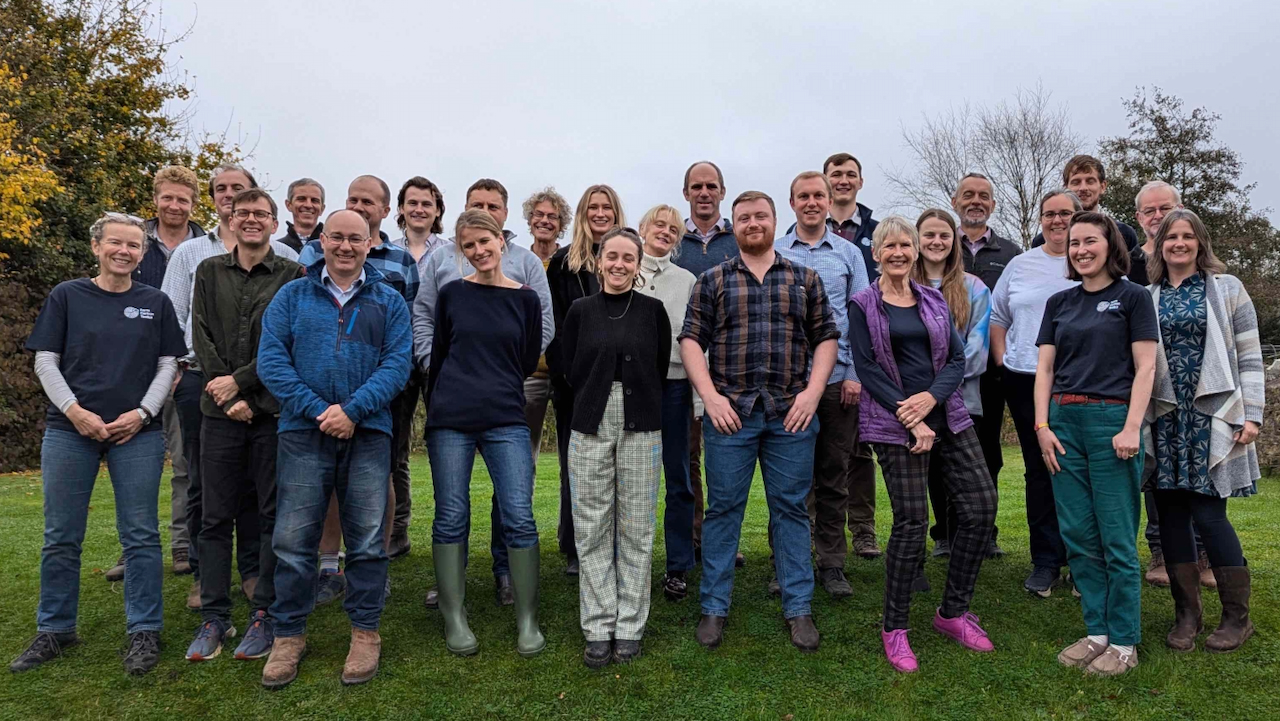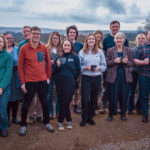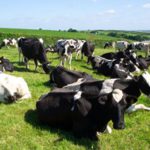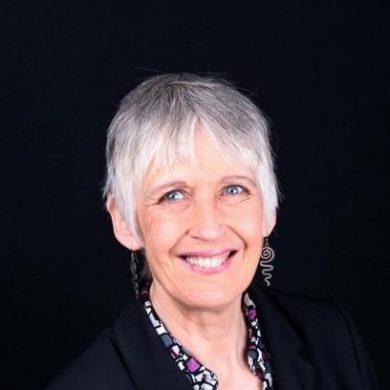
Liz Bowles
Liz is the Chief Executive Officer at the Farm Carbon Toolkit, a role she took on recently, having been a director there for the past five years. Liz has a wealth of experience of agriculture and food both in the UK and internationally. She has worked in the sector for over 30 years and brings a practical approach combined with scientific and sector knowledge to her roles.
Liz holds a BSc in Animal Science and is a Nuffield scholar, where her research involved exploring co-operation in the red meat sector and was a precursor to her joining EFFP. Here she worked on the development of supply chain collaboration in England. Other roles have been with English Food and Farming Partnerships and ADAS.
Liz is an Oxford Farming Conference Director and an advisor to Sell My Livestock. In her spare time Liz manages one of the largest pedigree flocks of Shropshire sheep in the UK and combines this with being a Council Member of the Breed Society.
Prior to joining FCT Liz was Associate Director of Farming and Land Use at the Soil Association. Liz brings not only an extensive expertise in the UK food and farming markets, but she also has a deep and practical understanding of the importance of improving soil health, reducing environmental impacts and greenhouse gas emissions from agriculture, and building resilience within the sector. She advocates that building economic resilience must occur alongside retaining product quality and animal welfare standards and building sustainable, regenerative practices on farm. Read ‘A day in the life of Liz Bowles‘
Location: South West
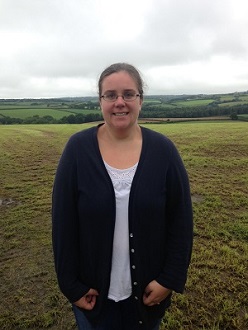
Becky Willson
Becky joined FCT in January 2014. Prior to this, Becky worked on the SWARM Knowledge Hub, a project tasked with helping farmers and growers across the South West manage their resources sustainably. As part of the SWARM Hub project, Becky was part of the team that developed the Farm Crap App, a mobile phone app to help farmers calculate the nutritive value of livestock manures.
A passionate advocate for highlighting the economic benefits of sustainable farming, Becky currently divides her time between working for FCT and working for Duchy College Rural Business School as a technical specialist in resource management. In 2016 Becky was awarded a Nuffield Scholarship to study further how to communicate carbon reduction schemes to farmers, which has fed into her work at FCT and Duchy College. Read ‘A day in the life of Becky Wilson‘
Location: South West
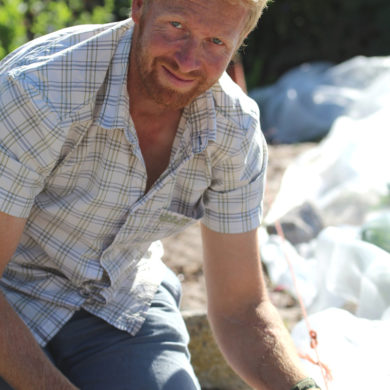
Jonathan Smith
Jonathan runs Scilly Organics, growing fruit and veg that is sold locally on the Isles of Scilly. From 5 acres he runs a small box scheme, has a small roadside stall and supplies cafes and restaurants. Sustainable, resilient and low carbon food production is something he does on a daily basis! Jonathan also has a yurt on the farm that he lets out to visitors.
He wrote and co-developed what is now the Farm Carbon Calculator. Our online tool available to farmers and growers that allows them to accurately assess the carbon footprint of their farm businesses. He oversees strategic direction and development of the Calculator, which is currently going through a significant and exciting phase of development.
A founder member of Transition Scilly, Jonathan has been heavily involved with community initiatives to reduce dependence on fossil fuels, reduce individual and collective carbon footprints, and increase the resilience of the community. Enabling sustainabile living has been a part of his life for the past 20 years or more.
Jonathan is one of the original directors of Farm Carbon Toolkit.
Location: South West
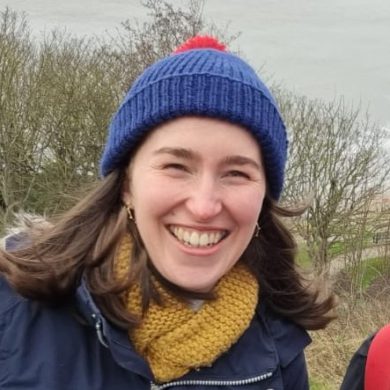
Lizzy Parker
Lizzy oversees the updates to our farm carbon calculator. Lizzy previously worked analysing large data sets from biochemical analysis of crop plants and led on projects supporting research software development at the University of Sheffield. Having also worked in the charity sector helping constituents communicate climate change issues with their local and national decision-makers, Lizzy is interested in overcoming barriers to the adoption of more sustainable practices. Her training as a soil biologist has led to a passion for the need to protect and safeguard the potential of our agricultural soils.
Lizzy grew up on the border of Somerset and Devon in a rural farming community. She is now based in Sheffield where she recently completed her PhD researching the effects of mycorrhizal fungi on barley during drought. She has a masters degree in Plant and Microbial Biology (MRes) and a degree in Biology with a Modern Language (BSc Hons). In her spare time, Lizzy volunteers with Foodworks, a Sheffield-based charity who repurpose surplus food and also grow their own within the city using regenerative principles. Read ‘A day in the life of Lizzy Parker‘
Location: Sheffield
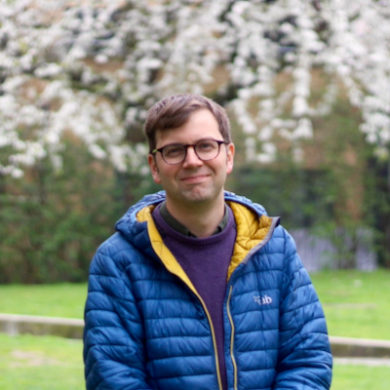
Samuel Smith
Sam was a Non-Executive Director between 2018-2024, and has been on the staff since August 2020. Sam was attracted to FCT because of its practical and positive approach – and the belief that farmer-to-farmer engagement is one of the best ways to support change in agriculture.
Sam previously worked with the sustainability non-profit Forum for the Future. His work there focused on supporting large organisations across the food and farming sector to grapple with the grand task of shifting our food and farming systems so that they support better livelihoods, healthier lifestyles and strengthened ecosystems. Sam is interested in how society can build greater resilience, while rapidly decarbonising and adapting to an increasingly challenging climate.
In 2012-16, Sam managed Sutton Community Farm, a community-owned horticultural farm and VegBox scheme on the outskirts of London, that creates a warm, welcoming environment for people to join in. Before this, Sam spent four years at the sustainability charity Bioregional, where he developed his interest in carbon and ecological footprinting. Part of his role there helped organisations to understand and act on their footprints.
In 2019, Sam was awarded a Nuffield Farming Scholarship which is focusing on the excitement and hope in the regenerative agriculture movement and whether it is offering a shared, transformative ambition for the food and farming sector. Read ‘A day in the life of Sam Smith‘
Location: Scotland
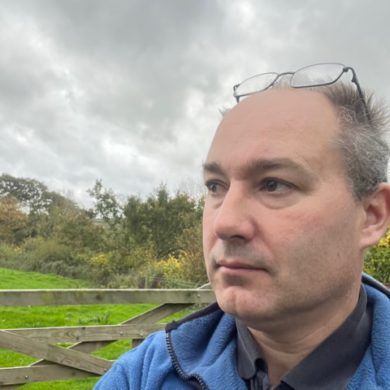
Tim Dart
Tim is a project manager for the Farm Carbon Toolkit. With a B.Sc. (Hons) in Agriculture and a Post Graduate Diploma in Rural Business Management. Tim has an international farm management, farm advisory background and a national policy background, having led the regional agricultural policy areas in Agricultural Resource Management and Animal Health and Welfare. Tim has also led and managed a protected landscape, led environmental partnership delivery for a local authority and worked and led farm advisory work and large scale habitat creation for a county wildlife trust. Tim has also established renewable energy businesses and owns and runs his own farm, implementing regenerative agro-ecological techniques.
Location: South West
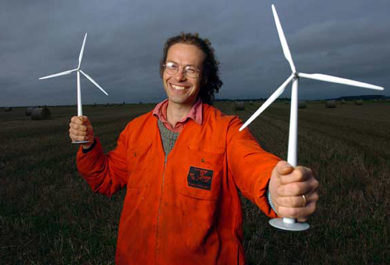
Adam Twine
I obtained a BSc in Agriculture from Reading University in 1983 and have farmed on the Oxon/Wilts border near Faringdon ever since. I am a tenant of the National Trust on 750 acres at Colleymore farm and a part owner of 450 acres at Westmill farm. The farm business has a 110 cow dairy herd, arable and beef enterprises, several alternative farm enterprises and a HLS scheme.
I have been working on renewable energy generation and energy saving on the farm for over twenty years ranging from a 5MW Solar PV installation (commissioned July 2011) to extensive use of insulation in the farm buildings, experimenting with a legume understory in wheat to reduce use of nitrogen and N2O losses, a heat exchanger for the bulk tank etc etc.
I spent far too long (17 years!!) setting up Westmill wind farm, the largest wind farm in central southern England (5 x 1.3 MW turbines – www.westmill.coop); for this I was a finalist in Farmers Weekly Green Energy Farmer of the Year 2010.
I also helped set up community owned Westmill Solar Farm alongside the wind farm, for which I was a finalist in the Farmers Weekly Green Energy Farmer of the Year 2013 and Farmers Guardian Renewables Innovator of the Year 2013. I’m very clear about the importance and urgency of engaging, both within and beyond my work, with the threat of climate change and our responsibility to make change. FCT is my attempting to do that within my profession.You can read more about Westmill wind farm here.
Location: South West
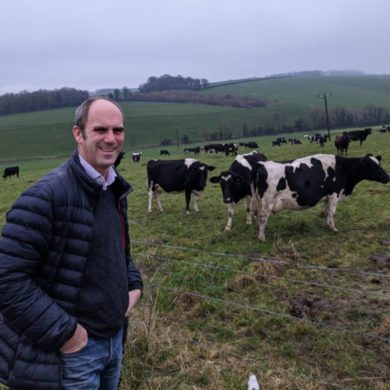
Andy Adler
Andy is a non-executive Director at Farm Carbon Toolkit. He qualified as a vet in 1997, and after a short period in mixed practice, went to New Zealand to learn how to be a proper farm vet. Returning to the UK in 2003, he has worked in farm practice ever since. In 2007, he embarked on a part-time MBA journey, aiming to enhance his business acumen and develop a strategic mindset for the future. From 2009 to 2019, he not only owned a vet practice but also took on significant leadership roles. He became the Chair of XL Vets UK Ltd and a Non-Executive Director of a Veterinary training business. In these positions, he focused on delivering governance, fostering growth, and building strong teams, all within an industry undergoing rapid corporatization.
He has always struggled with the tension within veterinary medicine between farmers wanting magic bullets to ‘cure’ their animals and the need to challenge farmers to create environments where they don’t get ill. He has always been more interested in how to create systems that deliver animal health and welfare so that pharmaceutical remedies are not needed.
In 2019, he made a significant transition, selling his business and joining Mole Valley Farmers. This move allowed him to broaden his understanding of Agriculture from different perspectives, encompassing nutrition, agronomy, and retail, all while managing their vet practice. This shift also sparked a deeper interest in how we can address issues of climate change and sustainability.
In 2022, he completed a short course in sustainability leadership at CISL. Understanding how to draw down carbon and farm regeneratively allows him to act as a bridge between farming, professional services, agricultural businesses, and innovative companies.
Since 2022, his consulting activities have been split between working with vet practices to strategically face the future and farming business to engage in regenerative farming.
He works with organisations to support their senior leadership teams in thriving whilst valuing their people and the planet.
Currently, he has his own consultancy business focused on supporting Veterinary and Agricultural organisations in facing the future with optimism and creativity to deliver a sustainable future where our grandchildren can be proud of the work we have done to cool the planet and bring back biodiversity.
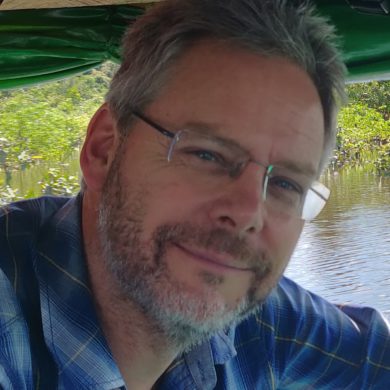
David Jones
David is a non-executive Director at FCT. He is co-founder of CO2eco, a start-up with a mission to create solutions for long term investments in nature recovery. The company is currently focused on projects in Latin America, implementing funding streams for the large-scale restoration of rainforest. His role immerses him in the emerging markets for ecosystem services and carbon removal, and he has a particular interest in how data and accounting must develop to underpin these markets. David is a chartered accountant and spent much of his career in leadership roles in finance and operations covering sectors including spatial data, landscape engineering, management consultancy and government regulation. His masters’ degree in Leadership In Sustainability at CISL Cambridge in 2019-21 included a thesis on a UK market for soil carbon sequestration, which led to the creation of CO2eco. He lives in Oxford, which he considers the epicentre of the civilised world, with its farming conferences and university faculties dedicated to climate transition and nature recovery. Out of work, you will find him outside enjoying nature – on bikes, boats or on foot.
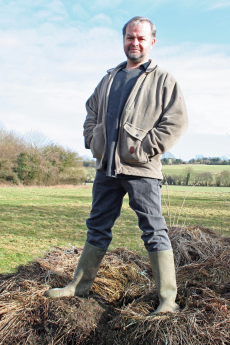
Andrew Rigg
Andrew is an arable farmer in Hampshire with a strong conservation and sustainability mind-set. Beyond the farm he has been involved in many initiatives primarily focused on climate change and renewable energy.
In the early 1990s he initiated, with friends, the setting up of a local environmental charity, which, with Andrew as its chair for 15 years, grew to employ 25 people.
Andrew has worked in wind, solar, storage and anaerobic digestion, and was a member of Forum for the Future’s Steering Committee for their “Farm Power – Putting Agriculture on the Grid” project. He was a founder of a Community Interest Company seeking to set up a local community bank focused on low-carbon and social enterprise lending.
He was also part of a team that established a new retail business, initially based at his farm, and remained a director until it reached £1M turnover.
Thus, Andrew has experience beyond farming of board management, fundraising, business start-ups, and working for government agencies and NGOs. He has been a director of Farm Carbon Toolkit since 2014.
His farm has been a net exporter of electricity from solar PV for over a decade, and this has also enabled his personal and business car use to be virtually carbon-free by utilising the PV to charge an electric car.
Location: South East
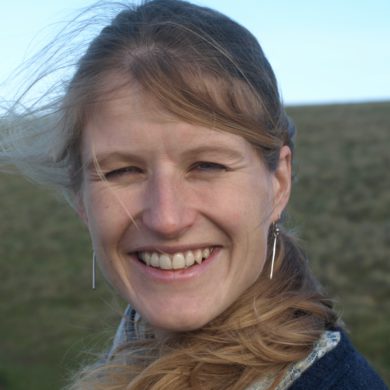
Hannah Jones
Hannah Jones is a Farm carbon and soils adviser with the Farm Carbon Toolkit. Hannah has previously coordinated and carried out research projects spanning herbal leys, arable systems, cover crops and field vegetables. Her role has been to coordinate farm-based trials by working closely with farmers and agricultural businesses to optimise the impact and applicability of the research. She has taken this experience and is contributing to the developing project portfolio of FCT. Her work includes bespoke trials which feed into the Farm Carbon Calculator, the advisory work and knowledge transfer. Her interests and drive focus around the business and environmental sustainability of farms, and her favourite days include discussing innovations on farm around a kitchen table!
She has a PhD in plant pathology from Oxford University, a degree in plant sciences from Birmingham University, a Masters in postgraduate teaching from the University of Reading, and is FACTS qualified. Hannah has taught crop sciences at Duchy College and the University of Reading, supervised 10 PhD students, and various masters and undergraduate students. She has contributed to a range of refereed papers relating to organic farming systems, wheat breeding, herbal leys, climate change effects on crops and plant breeding for diversity. Read ‘A Day in the life of Hannah Jones’
Location: South West
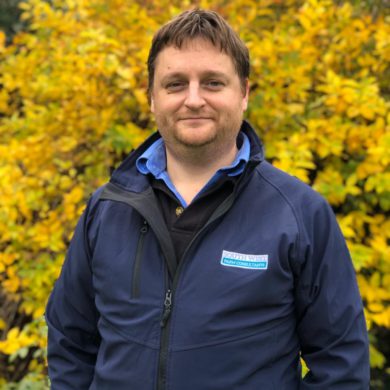
Anthony Ellis
Anthony is a Senior Farm Soil & Carbon Advisor. With a BSc (Hons) in Agriculture with Environmental Management and the BASIS Diploma in Agronomy, Anthony has spent a number of years working in commercial agronomy, environmental management and research and development in both the UK and Australia. Driven by a passion for sustainable, nature friendly farming, Anthony helps manage his family’s sheep and arable farm in Cornwall with his father.
Location: South West
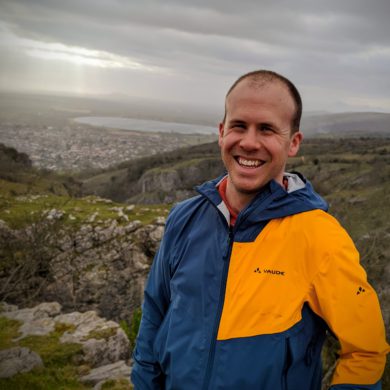
Rob Purdew
Rob is based on the Devon/Cornwall border and is one of our Farm Carbon and Soils Advisors here at FCT. Rob came to us from a farm advisory role with the Devon Wildlife Trust. Here he primarily advised farmers on management changes to help improve water quality, as well as helping farmers to provide wider ecosystem services. Rob has an extensive background in livestock and arable farming in the UK, and further afield in Canada. He is passionate about regenerative systems, especially grazing systems and believes soil health should be at the core of any farm business.
Rob has also previously been the Southwest Regional facilitator for Pasture for Life, providing advice and support for its members in the region. Additionally he has a BSc in Environmental Biology from the University of Nottingham. Read ‘A day in the life of Rob Purdew‘
Location: South West
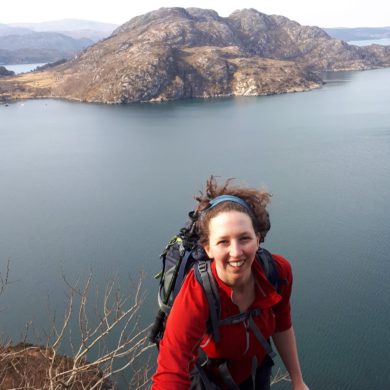
Izzy Peters
Izzy is our Data Scientist. She is passionate about getting useful insight from the valuable data we collect, using robust statistical techniques.
Izzy previously worked in the Scottish Government’s Agricultural Analysis Unit, collecting and processing data for the June Agricultural Census and the Sheep and Goat Inventory. She was part of a programme designed to overhaul the data collection procedure, so as to reduce the burden on farmers and improve the quality of the data collected and its relevance towards climate change and other challenges facing farmers. Before that, she completed a Masters in Applied Statistics with the University of Strathclyde.
Izzy lives in Cumbria and is part of Patterdale Mountain Rescue Team, and spends all the spare time she can exploring hard-to-reach crags in the Lake District mountains. Read ‘A Day in the life of Izzy Peters’
Location: Cumbria
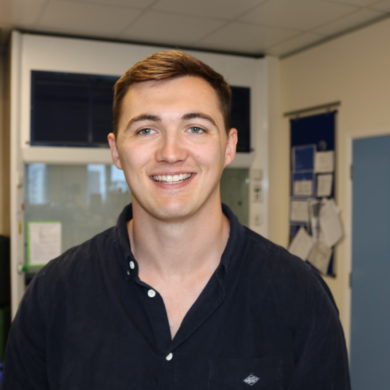
James Pitman
James is our Calculator Development Officer, in charge of keeping the calculator updated, relevant and accessible to farmers. As a molecular biologist, James has extensive experience in biochemical data analysis and research which is used to further the development of the carbon calculator. His passion for agriculture and sustainable practices stems from his upbringing on a small farm and his PhD from the University of Sheffield, which focused on improving potato crop storage in partnership with the AHDB. Read ‘A day in the life of James Pitman‘
Location: Sheffield

Grace Ella Wardell
Grace is a Calculator Development Officer, keeping the calculator updated with the latest scientific evidence and ensuring it functions smoothly for our users. Grace previously worked as a Research Technician in a laboratory studying legumes and their nitrogen- fixing symbionts. As part of her PhD research at the University of Sheffield, Grace worked with large sequencing datasets of soil microbiomes, investigating how soybean growth and soybean N2-fixing symbionts affect soil microbial communities in the UK. During this time, Grace found a passion for understanding the biology underpinning sustainable farming practices and the barriers farmers may face when implementing them, which led to her involvement in knowledge exchange events with farmers and communicating climate change solutions to eco-anxious young people. Prior to this Grace completed a Masters in Biological Sciences at the University of Sheffield investigating plant defence responses to pests and pathogens. Grace grew up in a coastal town in North Norfolk amongst farming communities that were interlaced within the beautiful natural coastline, where her interest in environmental sustainability began. Outside of work Grace can be found roaming the Peak District by bike or by foot or getting involved with ever-changing sporty hobbies. Read ‘A day in the life of Grace Wardell‘
Location: Sheffield
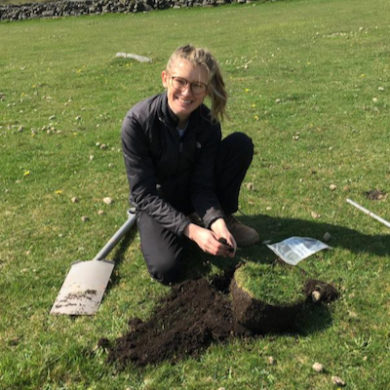
Tilly Kimble-Wilde
Tilly is a Farm Carbon and Soils Advisor for the FCT. Prior to this role, Tilly worked as a soil scientist, helping to support all elements of land development, management and regeneration by providing soil analysis and technical advice.
Her passion for soil was ignited and solidified during her masters degree at the University of Edinburgh and SRUC where she studied Soils and Sustainability. Here, she was able to research and study the impact of different land uses and farming systems on soil health and ecology, and the influence these practices have on the ability of soil to sequester carbon and regulate nitrous oxide emissions.
Location: South West
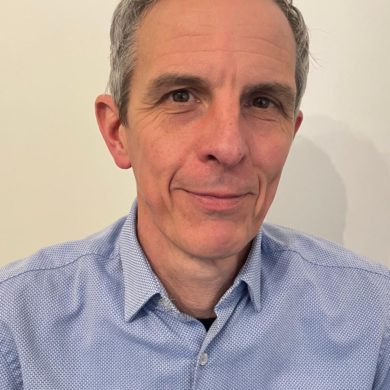
Emyr Williams
Emyr is one of our Farm Soil & Carbon Advisors. Emyr is passionate about climate and nature-friendly farming and particularly enjoys helping farmers to reap the benefits they can bring. Emyr has a BSc (Hons) in Agri-Food Marketing and MSc in Agroecology from Harper Adams University and holds BASIS Certificates in ‘Sustainable Land Management’ and ‘Greenhouse Gases, Carbon and Climate Change Mitigation’. Emyr also manages the family farm where he can usually be found digging holes in fields or restoring hedgerows.
Location: Wales and the Midlands
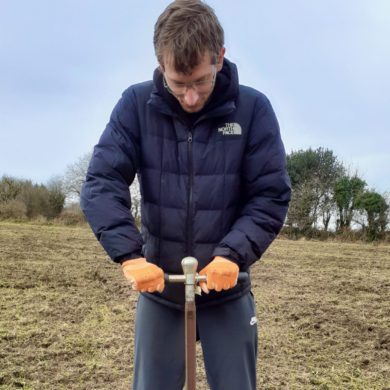
Joe Jones
Joe is a Farm Carbon and Soils Project Assistant with FCT. Before deciding to change his career, he taught abroad in South Korea where his childhood interest in nature and the environment was rekindled, and he decided to return to education.
Studying the Land and Ecological Restoration MSc at the Eden Project, he eventually decided to specialise in soil, influenced by the passion of his tutors, and specifically focussed on the field of soil health. Joe completed the second year of his MSc whilst also working as a Research Assistant on the EU-funded, ReCon Soil Project. His aspiration is to see a thriving natural environment where humans sustainably manage the land for physical, mental and emotional well-being. Read ‘A Day in the life of Joe Jones’
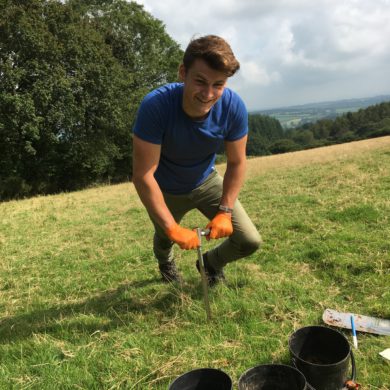
Stefan Marks
Stefan is based in Cornwall and supports a variety of projects at FCT, including work with Duchy of Cornwall tenant farmers and the Farm Net Zero project. Stefan grew up on a mixed tenanted family farm and studied Agriculture at the University of Reading. Here, a passion for soil health developed and became a central focus for his final year dissertation investigating the relationship between organic rotations and Soil Mesofauna populations.
Aside from the family farm, Stefan has a diverse range of on farm experience, including livestock, arable and vegetable production. He has long been passionate about regenerative agricultural practices, recognising how they can promote better soil health to improve resilience and provide a range of mutually beneficial ecosystem services. Read ‘A Day in the life of Stefan Marks’
Location: South West
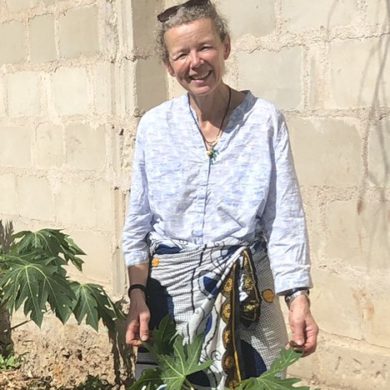
Jemma Morgan
Jemma works with FCT as a Farm Carbon and Soils Project Assistant. She has always enjoyed making and eating good food, with concern for sustainability and nutrition. She has also always been concerned about climate change and our environment, locally and globally. Having passed on a community project rescuing food which would otherwise have been wasted, she decided to ‘up the game’.
A distance learning Masters in Agroforestry and Global Food Security through Bangor Uni followed and Jemma is now committed to engaging farmers in carbon saving technologies, including increasing useful trees and hedges in farming systems.
In her spare time she works with a small Tanzanian NGO, supported by a small UK charity, ‘Friends of Empowering the Future’, providing education and support to smallholder and subsistence farmers in rural Tanzania where climate change is not well understood, but the consequences are already being suffered badly. Increasing knowledge, soil health and tree planting is an urgent priority. Watch out for the opportunity to join its ‘Farm Twinning’ programme, supporting others across the world who are also working for resilient livelihoods.
Location: South West

Calum Adams
Calum is a Data Assistant in the FCT Calculator team. Prior to this change of career, he applied his trade as a butcher for five years in Edinburgh before undertaking an MSc in Food Security at the University of Edinburgh and SRUC. Here, he found a passion for soil science and soil health. This led him to research a new biofertiliser involving crustacean shells as a potential new base material for a more sustainable phosphorus biofertiliser. With his deep interests in sustainability and data, Calum will be assisting the running and updating of the carbon calculator. He is particularly interested in the research and integration of new technologies to the calculator, helping improve the already great services FCT provide. Read ‘A day in the life of Calum Adams‘
Location: Scotland
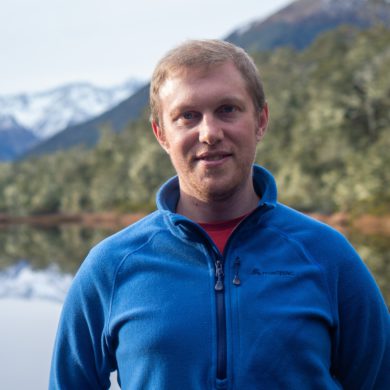
Michael Brown
Michael supports farms to understand their carbon footprint helping us achieve our ambition for the calculator to be the most trusted, robust and highly-regarded of its kind. This means keeping the tool accessible and user-friendly for all users whilst finding tailored solutions for those wanting to maximise their use of this industry-leading tool. With a Masters in Social Research and extensive customer service experience Michael brings a systematic and common-sense approach to helping our customers. Before working here Michael has, among other things, organised training and events in the dairy industry and helped with sales and administration for an environmental consultancy. Read ‘A Day in the life of Michael’
Location: Scotland
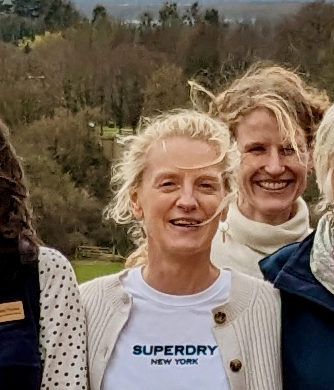
Rachel Hucker
Rachel is the Operations Administrator at FCT and is based near Exeter. She has extensive administrative experience in both the private sector and in Higher Education. Most recently, she was Executive P.A. to the President and Vice-Chancellor at the University of Exeter, a role she held for 14 years. Following her BA(Hons) degree in Modern Languages, Rachel worked and studied in Europe, Singapore, Australia and the Caribbean, and is now delighted to support the work of FCT and our partners. Her role is to provide administrative support to the Chief Executive, General Manager, Directors, Advisory and Calculator teams and to help organise FCT events and conferences throughout the year. Read ‘A Day in the life of Rachel Hucker’

